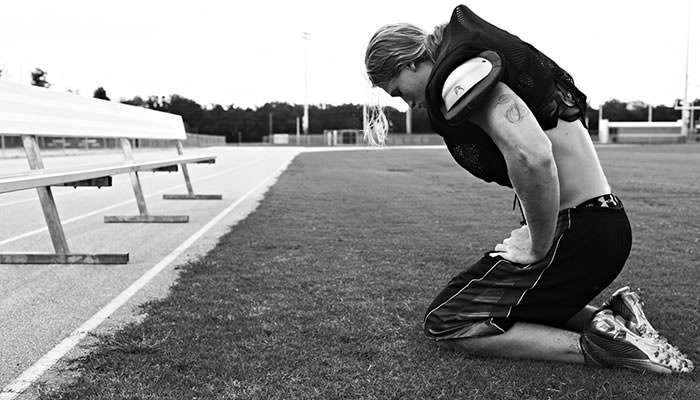It’s that time of year – kids are going back to school, high school football is starting back up, and students are starting to think about college. Stress levels are high, but so is optimism and excitement. There’s a lot to look forward to this year and this season, but if your high school athlete is overtraining, it could put it all at risk.
Many high school athletes all over the world are focused on one thing right now – performing the best they can for their team, their teammates, and for their future. They know that if they don’t perform their best they could let their teammates down, they could fall short of their goals, and they could even lose out on scholarship opportunities. Because of these potential consequences to subpar performances, it’s easy for a high school athlete to overtrain.
As a parent, mentor, teacher, or coach it’s important to notice the signs that a student-athlete could be overtraining. Here are some very common signals that need to be addressed:
1. Decreased appetite
Your high school athlete is still growing and with the added energy being spent on sports, their appetite should be very strong. Their bodies need to continuously be fed in order to keep up with their metabolism and the calories being spent during every day. If their appetite starts to decrease it could be a sign that hormones such as epinephrine and norepinephrine have increased which can cause a decreased appetite. If this is the case, it’s definitely time to scale back or take a rest day.
2. Muscle soreness lasting more than 72 hours
It’s normal to have some muscle soreness a day or two after workouts, but if it lasts longer than 72 hours, it’s important to schedule some rest. Extended soreness is a sign that muscles aren’t recovering like they should and that the athlete is probably overtraining them.
3. Illness
Overtraining can put your athlete’s body into a constant catabolic state which can decrease immunity and increase sickness and frequency of getting sick. Getting sick is a way of your athlete’s body telling them that it’s being pushed too far and too hard. If they’re starting to get sick more often it’s probably time to dial back their training schedule.
4. Increased resting heart rate
If you have a teen athlete that is very focused on training and improving their athletic performance, it would make a lot of sense to invest in a heart rate monitor. These can be worn at all times and can give you an idea of if your athlete is pushing their body too hard if their resting heart rate is higher than normal in order to keep up with the continued stress it’s being put through. Monitoring this closely will give you an idea of if your athlete’s body is being stress a little too far or too frequently.
5. Insomnia
If your high school athlete is having a hard time getting to sleep or staying asleep it’s likely that they are pushing their bodies too hard and that stress levels may be too high. Talk to your athlete to make sure that they are getting the necessary 7-8 hours of sleep each night. Athletes at this age need to make sure they are getting at least their eight hours due to their growing bodies and stress of training and sports.
6. Personality changes/irritability
Has your teen athlete grown increasingly irritable or has their personality changed or intensified? If so, there is a chance that their training schedule and stress levels are starting to really affect them. Pay attention to how their personality develops throughout their season(s) to help determine if it’s time to take a break or a day off.
Overtraining should be a serious concern for any coach or parent. In high school, athletes are far more prone to continuously training and not focusing on recovery because they don’t necessarily understand the benefits of daily recovery. Taking the time to explain and understand the importance yourself is very important to ensuring a successful season and a healthy athlete.
Overtraining can also make an athlete more prone to injury. An injury in the fall season can completely derail a year of sports and if that happens in a Junior or Senior year it can really affect scholarships. Keep your athlete healthy and on the field with our FREE 7 Steps to Prevent Injuries eBook! Download now!



Leave A Comment